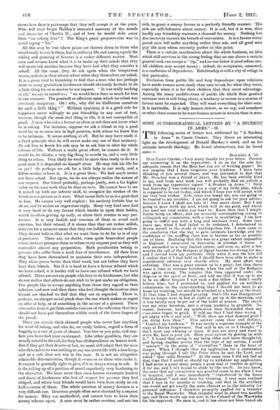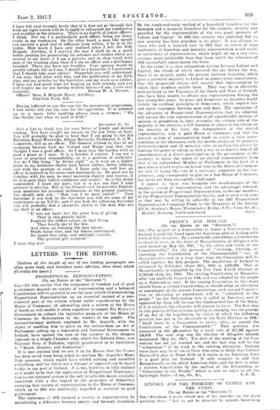SOME AUTOBIOGRAPHICAL LETTERS BY " A STUDENT IN ARMS."-1L
THE following series of letters was addressed by " A Student in Arms " to Canon Cremer. They throw an interesting light on the development of Donald Hankey's mind, and on his attitude towards theology. He hated abstractions, but he loved
men:— December 8, '15.
DEAR CANON CREMER,—Very many thanks for your letter. Pardon my answering it on the typewriter : I do so for the sole but adequate reason that the Mess has run out of writing paper ! Do not imagine that I have forgotten your kindness. I have been thinking of you several times, and was interested to find that Mr. Strachey was a friend of yqurs. He has been awfully kind to me, and from next week you will probably find an article a week from my typewriter signed " A Student in Arms " ! Only last Saturday I was ordering you a copy of my little play, which is supposed to be out to-day, and which I hope you will accept with my very best wishes. Now, since you tempt me, you are going to be treated to my troubles. I am not going to ask for your advice; because I know I shall not take it! One never does! But I am going to pour forth my soul, which will do me good, and which you need not read- unless you want to. Know then that I simply loathe being an officer, and am seriously contemplating trying to relinquish my commission, with a view to re-enlisting. I am now going to inflict you with a long and intricate story. Some four years ago, when I had failed to be ordained, I determined to devote myself to the study of working-class life. I soon came to the conclusion that the way to gain intimate knowledge and the confidence of the working class was to become as far as possible one of them. Realizing that this was to a great extent impossible in England, 1 emigrated to Australia, to attempt it there. I only succeeded to a very limited extent, and even so, after a few months the call of the fleshpots of Egypt became too strong for me, and I retired from my positions. Only when it was too late did I realize that if I had held on I should have been able to make a considerable advance very shortly after. My next effort was enlisting. That was a great success up to a point; but then there. came a time of extreme boredom, when the call of the fleshpots was again strong. The tempter this time appeared under the disguise of the spirit of Duty, and told me that it was up to me to be an officer because I was such a fine fellow. I didn't really believe him; but I pretended to, and applied for an artillery commission on the understanding that I should not have to go• home for training, but should be attached to a battery at the front. At that time I had stopped praying. One's life was disorganized. One no longer went to bed at night or got up in the morning, and it was fatally easy to get out of the habit of prayer. The result was my utter boredom, and a strong tendency to grumble. No sooner, however, had my application been forwarded than my conscience began to prick. It told me that I had done wrong. I got angry with it and said: " Well, show me what damned good I am doing here then." This answer came clear and distinct, " Comfort my brethren." It was surely a supreme example of the ways of Divine forgiveness. God said to me, or so I thought, " I don't want any whining or tears. If you are sorry and want to serve Me, here is your job. Show your sorrow by getting on with it." I found that owing to my being older and more thoughtful, and having steadier nerves than the boys of my section, I could- " comfort " in the sense of " strengthen" them in the hour of danger. When I thought that my application for a commission was going through I felt like Peter when he met the Lord, and asked "Quo vadis Domine?" At the same time I did not feel at that time that I could or should try to withdraw my application. I had given a great many people a good deal of trouble in getting. it for me, and I felt bound to abide by the result. As you know, the news that my commission was granted came to me when I was in hospital, and I was immediately "transferred to the home establishment" and sent here for training. I very soon realized that I was in for months of training, and that in the artillery one would net get nearly the same chances as in the infantry for personal influence. I therefore promptly applied for a transfer to the Royal Warwicks. That transfer went in about two months ago, and- three weeks ago wee sent to the Colonel of the. Warwicks for his.approvaL He nave it, and it has since not been heard of, I have felt very strongly lately that if it does not go through this week my right course will be to apply to relinquish my commission and re-enlist in the infantry. There is no dearth of junior officers, I think. Nor am I a particularly good officer, being too demo- cratic in my tendencies. On the other hand, a man like myself can exercise a good deal of influence from within, if he is in the ranks. How much I have only realized since I left the Rifle Brigade. Further, if I survive the war I shall be in a much better position for prosecuting the schemes and studies which are nearest to my heart if I am a private, and in close touch with men of the working class, than if I am an officer and a gentleman branded. There you have my troubles. Your opinion would be greatly valued; but as I say, I should be a hypocrite if I pretended that I should take your advice! Meanwhile you will understand, I am sure, that what with this, and the publication of my little play, and my articles for the Spectator, and my work as a soldier, I have not had much time for keeping up with friends, and you will forgive me for not having written before.—I am, yours very sincerely, DONALD W. A. HANSEL Officers' Mess, E Brigade Heavy Artillery, Charlton Park, S.E.
Having inflicted on you the case for the ministerial programme, I had better tell you the case for the opposition. It is summed up in a nasty little rankling phrase from a sermon: " We like thrills; but what we need is drill."
December 27, '15.
Just a line to thank you for your letter of kindly and shrewd wisdom. You have caught me square on the jaw twice at least. You will probably be glad to hear that I am going to the 3rd Battalion Royal Warwicks, Albany Barracks, Parkhurst, I. of W., to-morrow, still as an officer. The General refused to hear of my resigning because both my Colonel and Major said that they thought I was a good officer. So I must bear the burden with as good a grace as 1 may. It is a burden, I confess. I am not a lover of practical responsibility, or of a position of authority. Nor do I like being " by divine right " as it were on a higher plane to my brethren—better food, better clothes, better lodging, and with the prestige of rank. I know only too well how an officer is isolated in his caste—and necessarily so. He must not be familiar with his men, he must maintain dignity and reserve, if lie is to gain their fullest confidence and respect. So is the Army constituted. I know my part; but it is not one that I take pleasure in playing. But as the General said, no patriotic English- man mentions his personal inclinations at the present juncture, but should only ask: " How can I be most useful? " Next Saturday if you look in the Spectator you will see some of my experiences as an N.C.O., and if you look the following Saturday you will probably find a character sketch of the man who was my ideal of an officer.
"It was not hate; but thy great love of giving That in this ghastly strife Inspired thy selfless valour, so that living Thou 'hourly gav'st thy life.
And when, on rescuing thy men intent, Death found thee, and thy labour intercepted.
He found thee calm, and smilingly content, Thy greatest gift accepted."
I must stop now.



























 Previous page
Previous page